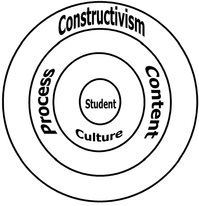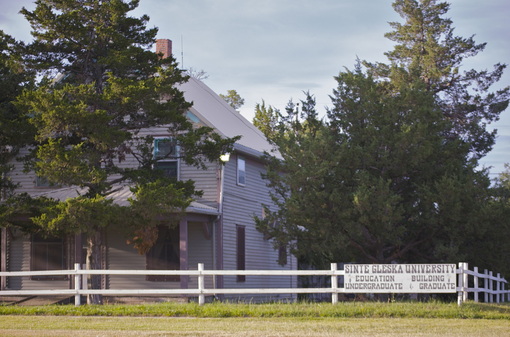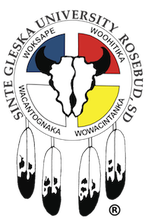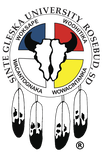Education Department Information:
Mission StatementThe Education Department of Sinte Gleska University improves the learning process of ALL children through the development of effective facilitators of knowledge, understanding and values. This mission includes planning that relates to understanding of the past, its connections to the present, and the implications for the future. The mission contributes to tribal autonomy and cultural strength. It also contributes to individual development that is characterized by reflective thought, self-development, and a life-long seeking of wisdom.
The mission of the Education Department contains four main strands: One addresses the need for effective facilitators of a journey of the wakanyeja (children). This includes an understanding that, even as shown in the terminology, children are sacred. Therefore, in the early years of learning, there will be a pedagogy that is grounded in the Lakota culture and leans to a life-long search of the ultimate goal, woksape (wisdom). Graduates in education will be committed to the Lakota wisdom of looking ahead for seven generations. Consequently, planning is based on this tradition, especially as it affects children. This includes looking to the past so that the traditions and values of today are understood and transmitted to the future. The pedagogy espoused by the Education Department is respectful of the values of the Lakota and are based in past tradition and are requisite for the future. The Teacher Education Program will assist Sinte Gleska University in strengthening tribal culture and government. This includes the teaching of the four Lakota virtues: Woksape (wisdom); Woohitika (bravery); Wowacintanka (fortitude); and Wacantognaka (generosity). Educators in reservation classrooms will promote the ideals of tribal sovereignty and self-determination. Graduates of the Education Department will model and promote the concept of life-long learning so that young children will see it as a value. This includes a reflective approach that will lead to self-development and is in keeping with the Lakota value of seeking woksape, a journey that takes most of one’s life. |
Education Staff |
Accreditation StatementSinte Gleska University has been accredited by the Higher Learning Commission of the North Central Association of Colleges and Schools since 1983, making SGU the first tribally chartered college in the nation to become accredited at both the associate and baccalaureate levels. All SGU Education Programs are aligned with the following: State of South Dakota Standards (ARSD) National Specialty Professional Association (SPA) Standards Association for Childhood Education International (ACEI) Council for Exceptional Children (CEC) National Council for the Social Studies (NCSS) Interstate New Teachers Assessment and Support Consortium (INTASC) Competencies To ensure quality programs, the Education Department is reviewed by state and national accrediting agencies. Sinte Gleska University’s Education Department is accredited by: South Dakota Department of Education (SDDOE), Commission on Institutions of Higher Education, North Central Association of Colleges and Schools (NCA, College Level) South Dakota Department of Education Accreditation Statement: Sinte Gleska University’s Educator Preparation Program (EPP) was fully accredited for seven years through the South Dakota Department of Education following an on-site review in October 2018. This is the link for the complete report: https://doe.sd.gov/oatq/teacheredprograms.aspx |
Conceptual Framework
The Education Department’s conceptual framework was developed in 1990 by department faculty members, local educators, many who were graduates of the SGU education program, respected elders, and students in the program. After developing a new mission statement for the department, it was decided that a visual representation would better explain the constructivist approach that the department was going to pursue. Based in part on the research by Martin Brooks and Jacqueline Brooks and the wisdom of the elders, the conceptual model and mission statement provided a strong foundation for the education of future teachers.
By placing the student in the center of the framework, one must realize that the knowledge, skills, and beliefs that students bring to the program must be honored. By building on the students’ prior knowledge and experiences, future teachers are provided a culturally-relevant model that will allow them to pass this honoring on to the students that they will teach. Culture is the second component of the framework. Through an understanding of one’s own culture, other cultures can be respected. Modeling culturally-relevant pedagogy in the Education Department’s courses is a key factor to the satisfaction and success of Sinte Gleska University graduates. When the idea for a conceptual framework was being considered, it was understood that there had to be a specific process that reflected the Lakota culture and values in the development of the program, the teaching of the courses, and the field experiences and internships that students would be required to complete. The content was expected to be culturally-relevant and based upon the traditions of the past, their connections to the present, and the implications for the future, as is stated in the department’s mission statement. This meant that cultural values and teachings had to be incorporated in traditionally western European thought taught in textbooks. By looking at a process in which students would be held responsible for their own learning, for modeling the Lakota values, and for the realization that learning is a life-long journey, the constructivist model of education was chosen. Nearly twenty years later, this conceptual framework and mission statement have proven to be a strong foundation upon which the program was structured. |



